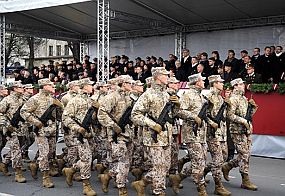Baltic States – CIS, EU – Baltic States, Financial Services, Legislation, Russia, Security, Ukraine
International Internet Magazine. Baltic States news & analytics
Friday, 19.04.2024, 00:51
Baltic States tackle defense spending after Crimea takeover
 Print version
Print version |
|---|
The three countries of 6.3 million people will mark on Saturday a decade since joining the NATO military alliance, a move seen as a bulwark against unwanted Russian overtures.
Relations between the Baltic States and Russia have been tense since they broke free from the crumbling Soviet Union more than two decades ago.
But security fears have risen in the ex-Soviet states since Russian forces intervened in Crimea, leading to a disputed referendum and the annexation of the Russian-speaking Ukrainian peninsula.
Estonia and Latvia are also jittery that their large ethnic-Russian minorities, which make up a quarter of the population in both countries, could make them vulnerable to interference from Moscow.
"Russia's aggression against Ukraine brought some politicians back to the reality that it is important to finance defense," Lithuanian Defence Minister Juozas Olekas told AFP on Friday.
Lithuania and Latvia say they will increase defense spending by 2020 to NATO's recommended two percent of gross domestic product, from the current level of 1% of GDP. They had slashed military spending as part of austerity measures designed to pull their economies back from the brink of collapse during the global financial crisis.
Estonia already meets NATO's two percent benchmark and "does not plan to increase or decrease spending", defense ministry spokesman Peeter Kuimet told AFP.
"As we see what is happening in Ukraine, we realise once again just how fragile freedom is," Lithuanian President Dalia Grybauskaite told parliament this week as parties across the political spectrum vowed to spend more on the military. "Until help arrives, we must be able to defend ourselves."
The moves to boost spending come after US President Barack Obama said Wednesday he had "some concern about a diminished level of defense spending" among NATO members. "The situation in Ukraine reminds us that our freedom isn't free," Obama said in Brussels. "We have to be willing to pay" for mutual security to ensure the maintenance of a "deterrent" force.
But none of the Baltic states has any illusions that they could defend themselves without NATO help in the face of any imminent Russian threat, the AFP points out.
"It's important to counterbalance current developments with adequate NATO deterrence measures by strengthening the NATO and allied presence in the Baltic region," Latvian Defense Minister Raimonds Vejonis told AFP on Friday. "Rapid security developments in Ukraine indicate the importance to react immediately on short notice."
Since Moscow's entry into Crimea, both NATO and Washington have been at pains to emphasize their commitment to mutual defense under Article 5 of the North Atlantic Treaty.
Visiting Vilnius last week, US Vice President Joe Biden said Washington was mulling whether to send forces to the Baltic states. He also stressed the United States' "ironclad" commitment to mutual defense under NATO.
The US has already sent six extra F-15 fighter jets to boost NATO's long-standing air patrols over the Baltic states along the Russian border. Britain, Denmark and France also offered additional warplanes.
NATO has deployed AWACS reconnaissance aircraft to overfly Poland and Romania as part of its efforts to monitor the crisis in Ukraine.
The regional tension in the Baltics has moreover spawned a spike in interest in military service unseen in the last decade. "The number of military service requests increased by 20% in March compared to the same period last year," said Captain Skomantas Povilionis, spokesman for Lithuania's defense chief.








 «The Baltic Course» Is Sold and Stays in Business!
«The Baltic Course» Is Sold and Stays in Business!

